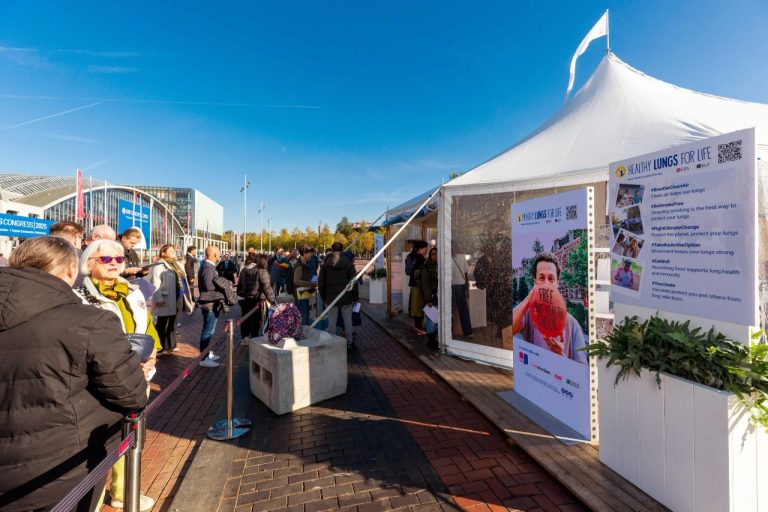RAI Amsterdam’s convention centre is increasingly evolving into a platform for social impact. This became evident this year during two major medical congresses, where Amsterdam residents were offered free lung and liver screenings. An initiative that not only raises awareness but also demonstrates how conferences can contribute to public health and knowledge sharing – both locally and internationally.
RAI Amsterdam promoted the liver and lung screenings throughout Amsterdam and the Netherlands with a PR campaign. The actions surrounding lung and liver health also received media attention, bringing the topic to the forefront of the national agenda.
On 28 September, 2025, a public health initiative took place at RAI Amsterdam as part of the European Respiratory Society (ERS) Congress, the largest lung congress in the world. Hundreds of Amsterdam residents took advantage of the opportunity to have their lungs tested for free. The initiative was organised by the European Lung Foundation (ELF) and ERS, in collaboration with RAI Amsterdam, the Lung Foundation Netherlands, and the Amsterdam Convention Bureau of amsterdam&partners.
The lung screenings were part of the ‘Healthy Lungs for Life’ campaign, which this year focused on lung health in Amsterdam and protecting the lungs of children and young people. On the square in front of the venue’s Entrance K, visitors could take a simple breathing test that measured the capacity and vitality of their lungs. Pediatric pulmonologist Mariëlle Pijnenburg explained: “The value from the lung test indicates how large the lungs are and whether air can pass through easily. It’s a simple test, but it provides a lot of information.”
In the Netherlands, 1.2 million people suffer from chronic lung disease, including over half a million with COPD. Lung diseases rank fourth as a cause of death among adults. By offering accessible screenings, not only is awareness raised, but early detection is made possible – a crucial step in preventive care.
Liver screenings during EASL Congress
As already reported on CMW, during the EASL Congress (European Association for the Study of the Liver), held 7-10 May, 2025, health was once again brought outside the walls of the convention centre. Right on the square in front of Entrance C, Amsterdam residents and congress attendees could have their liver checked for free using a painless fibroscan. Results were provided immediately and explained by medical professionals.
Gastroenterologist Bart Takkenberg from Amsterdam UMC emphasised the importance of early detection: “Liver diseases are often discovered at a late stage. In the Netherlands, an estimated two million people have fatty liver disease, often without knowing it. Around 400,000 people are at risk of serious liver damage or liver cancer. By offering accessible screenings, we may be able to reverse this trend.”
To engage young people with the topic of liver health, the ‘Love Your Liver Project’ was launched. This school programme, developed by the Amsterdam Convention Bureau in collaboration with EASL, targeted students in Grades 7 and 8. They received lessons on the importance of the liver and making healthy choices, taught by gastroenterologists from Amsterdam UMC and Haaglanden Medical Center. Visitors to the screening location could also explore a giant inflatable liver from the inside – an educational experience for all ages.
These initiatives illustrate how RAI Amsterdam positions itself as an active partner in creating social value. By collaborating with organisations and local partners such as the Amsterdam Convention Bureau, the impact of conferences is amplified— – not only within the walls of the convention centre but also beyond.
“We want to show that an international congress can also have a positive local impact,” said Katelijn Wilhelmy, spokesperson for RAI Amsterdam. “By facilitating free health screenings and initiating a PR campaign, we make knowledge accessible to everyone. That’s what we stand for as a platform.”
The examples of ERS and EASL show that conferences can be more than gatherings for professionals. They can serve as catalysts for social change, awareness, and prevention. By opening their doors to the public and collaborating with local partners, the gap between science and society is narrowed.
Source: www.exhibitionworld.co.uk


Comments are closed.